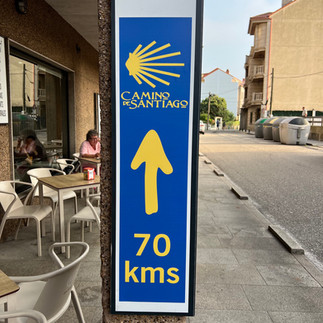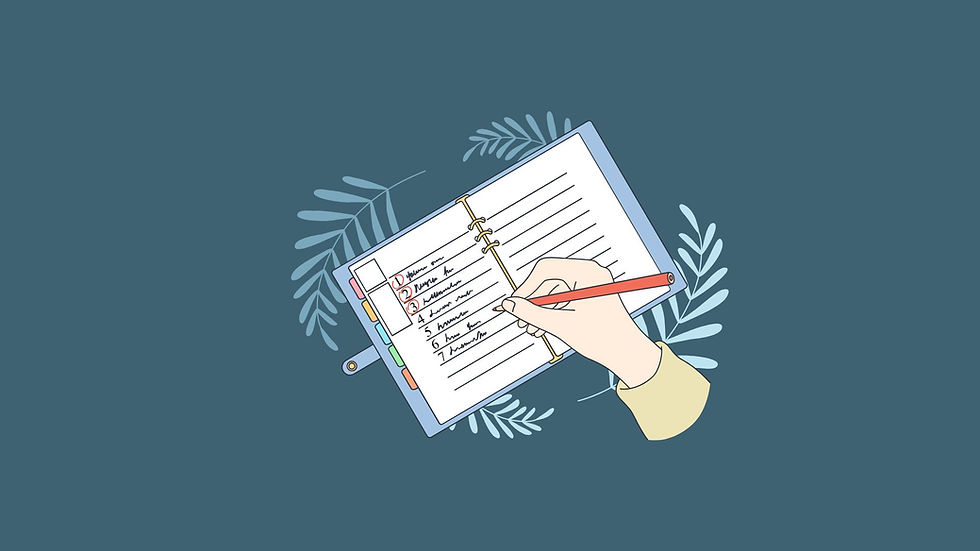Why Walk the Camino de Santiago? Expectations vs. Insights of the Spiritual Path
- yuliiaprybytkova
- Sep 12, 2025
- 6 min read
I went on the Camino de Santiago with a huge… no, not just a backpack, but also a whole set of expectations. Of course — people have been walking these pilgrimages for a thousand years in search of spiritual revelations and enlightenment!
My list of expectations had three points:
to revisit my life vision,
to say goodbye to the country,
and — to give myself a kind of endurance test.
If I managed the last two pretty well, the first one — and the most important, to remind myself “where am I going and why at all” — turned out to be "a bit too much". Even for 280 km walked solo.
So, this is a text about expectations from a spiritual journey, insights, revelations, and “what on earth to do with all that afterwards.” Part 1 with A Practical Day-by-Day Guide How to Organize a Solo Coastal Route in Portugal and Walk Your Own Transformational Journey - you can find here.
About vision
My professional interest lies in the field of planning and is built on the idea of a global life vision. When a person creates an image of themselves in the future (at 50, 80, 100 years old) and asks:
‘What does my life look like at that age? What matters to me, what doesn’t?’
And from that perspective, the plan for years, months, and days takes shape.
In fact, a global life vision is a vector. And to avoid straying off your life’s path, you need to regularly keep working with it. That’s what I had in my imagination: I’d walk and at the same time rethink my life vision. And as the Camino is “the spiritual path,” this beautiful picture of my “dream life” would gain an almost divine aura.
And guess what?
I just couldn’t do that. I simply lacked the time and energy. Despite my habit of regular self-reflection and the fact that I walked solo for 12 days, too much effort went into keeping my mortal body in working condition.
The obvious conclusion: thinking about the global is a pretty big task — and it’s almost impossible to deal with it on the go. Moreover, you need to do it with full immersion, an open heart, and in the right environment.
As a result, I postponed this personal exercise for the beginning of October when I will lead the “Life Vision & Values" training in Notion. I’ve already redesigned the program so it will only take 4 intensive hours of work instead of a whole month. And I will work on mine just before I start doing it with the group. If such an experience resonates with you — you can sign up here.

Let's get back to the question of expectations
Do you know who definitely “found what they were looking for” on the Camino de Santiago?
A gorgeous blonde from Denmark I met on the 8th day. To the standard question, “So, what are you looking for on the Camino?” (implying: “What problems are you dealing with?”) she answered simply:
“I’m 21, I don’t have kids, a husband, or problems. My goal is fun!”

All those stories about divorce, losing a job, losing life anchors and reference points — they sound like perfect reasons for such an adventure. But no matter how much it bothers us, enlightenment isn’t guaranteed anywhere: not in a monastery, not in a therapist’s office, not even on the Camino. It can fall on your head like a rock on a perfectly ordinary workday, or it can sprout slowly through years of daily spiritual practice. You never know in advance.
That’s why all those conditions like “once I lose weight,” “once I get married,” “once I move” — as reasons to finally allow yourself to be happy — only make our experience hostage to our own expectations.
But fun — yes. Fun, and discovering something new about yourself, like: “Wow, turns out I can actually walk 280 km!” — that, to me, is the perfect height for the Camino de Santiago. Everything beyond that — let’s leave it up to Saint James.
Speaking of Saint James and the Religious Side
I went to mass on my last evening in Santiago de Compostela, in the main cathedral — just out of curiosity. I had never been to a Catholic mass before and… left after 15 minutes. For me, it was a little “too much” (too theatrical, too crowded, too “aromatic”...).
But the conclusion I carried out of that church was truly divine — no less. People crave to believe in something BIG, they do, and they always will.
So, anyone who laughs at your dream, your goal, or your vision — don’t bother to “send them to hell,” no. Send them, quite literally, to the relics of Saint James, discovered 900 years after his death and which have become the destination people have been walking toward for a thousand years.
Key Insights
First: “I can do more than I think.” That alone powerfully boosts your self-esteem.
Such knowledge about yourself is a huge brick in the foundation of your personality, the base where dreams and goals grow, where life takes shape. These bricks don’t just fall on your head by themselves — they are burned into you by sweat, tears, and bloodied feet. You can only earn them by living through the experience on your own skin.
Second: “Not to fear silence.”
Imagine this: you walk all day along the ocean and the roads, counting your breaths. In your head — elusive silence, or at the very least, the sound of waves. And then, suddenly, a chatty person appears. Against that background of silence, the emptiness of the conversation becomes especially clear. Think about it: how much do we talk out of “politeness” or the desire to be a “decent person”?
As someone whose profession is all about talking, I know how valuable a good conversation can be. But what silence does — that’s another level. In it, you suddenly feel your unity with the world. You remember that this whole beautiful and unbearable mess called life is just a moment. One blink — and it’s all gone!
So yes, it’s good when there’s someone to talk to. But how amazing it is when there’s someone to share silence with.
Exercises and book
I walked and tried to be aware of myself in the present moment. A kind of meditation on the now. Paying attention to my breaths, my steps, the sensations in my body. Noticing: “oh, that’s a thought,” “that’s a memory,” “that’s a fantasy” — and pulling my attention back from neighboring galaxies into the “now.”
It’s one of the hardest exercises for me!
When I got tired, I switched to a book. Twice in 12 days I listened to Eckhart Tolle’s A New Earth. The book is exactly about this — that the present is all there is; that suffering is the game of the ego, and it dissolves the moment we remember we are part of this endless ocean called being.
A wonderful book, perfect for an adventure like the Camino. I’ll definitely listen to it again.
Another important exercise I want to leave here — for myself, not to forget, and for you, readers. This exercise is writing a journal by hand.
I know everyone has their own way of reflecting, but I feel that while I’m writing in a journal, my understanding of something crystallizes. When I find the right word, when a paragraph or even a page forms — the idea takes shape, and the magic happens: understanding is born.
And by the way, it doesn’t have to be freewriting (when you just pour out whatever comes to mind). It can be bullet points: “Idea 1,” “Idea 2”… It works just as well.
The benefit of this practice isn’t straightforward. It’s not like food: eat a pie — you’re full. It’s more about building depth and contact with yourself. It’s a delicate process of working with your stones, which one day may turn into diamonds.

And finally, about signs
Any stage of life — whether the Camino, studying, emigrating, or moving — can be lived like a game of “signs from the Universe.” On the Camino, it’s the rule itself: follow the shells. They are literally everywhere, leading you to the final point.
In everyday life, we make up our own signs. Sometimes consciously — like the black cat, “got out of bed on the wrong side,” or a lucky number. But mostly unconsciously.
We form a set of beliefs (“all men are jerks,” “girls are gold diggers,” “politicians are corrupt”), and then we literally collect every bit of evidence to prove them.
The flashlight of human attention shines where the “light-holder,” convinced of something, points it. And no, if the light-holder believes all men are jerks, that doesn’t mean good men don’t exist. It just means the light-holder has the kind of nature that seeks proof of what he already believes and highlights only that.
Strange thought: we don’t even have to believe ourselves if those thoughts only bring pain. Maybe it’s just time to change the light-holder.
That’s it.
I’m really glad to finally finish writing my second text about the Camino de Santiago. With a light heart, I put a period on making sense of this adventure.
To everyone heading out on the Camino — Buen Camino!




























Comments